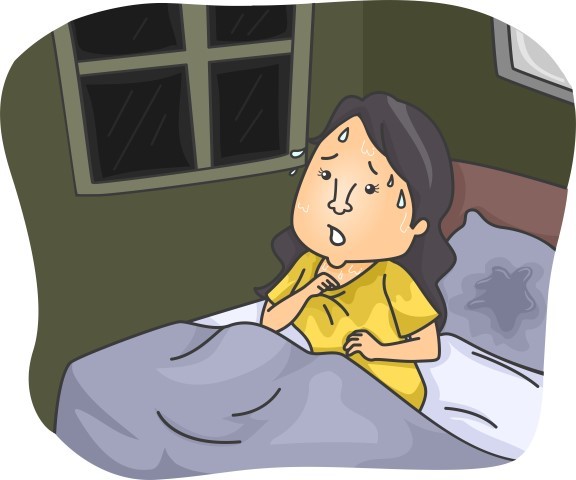If you have experienced night sweats before, you know it’s not an especially pleasant experience. Everyone wakes up every now and again feeling a bit overheated. Although uncomfortable, there is a difference between these episodes and true night sweats. Night sweats are characterized by “extreme perspiration” (as in, soaked bed sheets) and they are typically associated with an underlying medical condition or genetic predisposition. To help you get a better idea of what may be causing your issues, our board-certified gynecologist Dr. Kristine Gould has detailed four of the most common causes of night sweats for women:
Menopause
Menopause is by far the most common cause of night sweats in women. During the perimenopause period, many women experience hot flashes that result from fluctuating or decreased levels of estrogen produced by the body. If a hot flash occurs at night, this can lead to night sweating.
Increased Risk of Heart Disease
For middle-aged women, experiencing regular night sweats can be a sign of increased risk of cardiovascular disease, according to a study in the International Journal of Obstetrics and Gynecology. Several factors that can lead to increased night sweating like high blood pressure, diabetes, and being overweight are also risk factors for heart disease risk.
Reactions to Certain Medications
Night sweats may occur as a side-effect of many medications women take. This includes certain common antidepressants. Many hormone treatments, including birth control and those related to cancer treatments can also lead to night sweats. This also applies to certain diabetes drugs, which can cause night sweats if a person’s blood sugar drops too low.
Certain Gynecological Cancers
Several types of cancer, including ovarian cancer, can cause night sweats. If, in addition to your night sweats, you experience symptoms like unexplained fever, bloating in the abdominal area, pelvic pain, or frequent urination, you should contact your gynecologist to find out if it’s a warning sign from your body.
It’s important to remember that night sweats can be hard to differentiate from normal flushing or redness. Also keep in mind that there are many other potential causes of night sweating and you may require a visit with your board-certified gynecologist to discover the cause of your symptoms. For more information on night sweats or if you would like to request an appointment, please contact Dr. Kristine Gould at Gynecology Associates of Gwinnett today. You can also follow us on Facebook, Twitter, and Google+ for more tips, news, and updates.


